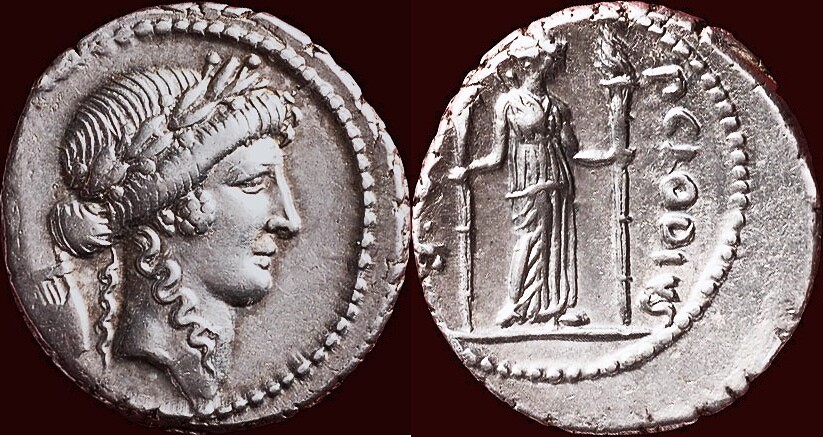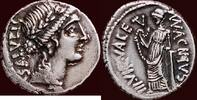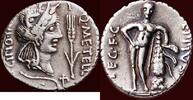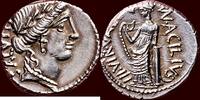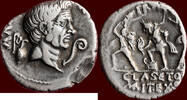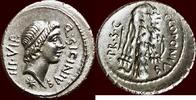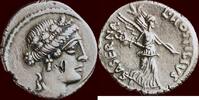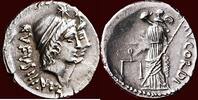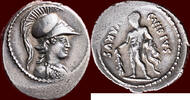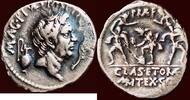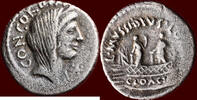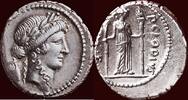MA-ID: 8119302010
Bewertungen Henzen
Schnelle Lieferung. Super Ware. Vielen Dank!
O.K.
perfekt !!!
Great coin, quick delivery, thanks!
AR Denarius (42 BC) ROMAN IMPERATORS - PUBLIUS CLODIUS, MARCI FILIUS TURRINUS - ALLY OF JULIUS CAESAR - Rome xf-
Munthandel G.Henzen 

10
Seit 10 Jahren bei MA-Shops
7244 Bewertungen,
100 % Positiv (seit 24 Monaten)
Weltweiter Versand
525,00 EUR
Differenzbesteuert nach §25a UStG
zzgl. 13,00 EUR Versand ( nach Deutschland )
Lieferzeit: 5 - 8 Tage*
zzgl. 13,00 EUR Versand ( nach Deutschland )
| Bestellhotline +49 (0)2871 2180 383 |
| Zahlungsarten |
| Überweisung |
xf- | Abkürzungen
18,00 mm
weight 3,75gr. | silver Ø 18mm.
obv. Laureate head of Apollo right, lyre behind
rev. Diana Lucifera standing right, holding two long torches,
P•CLODIVS on right, M•F• on left
Like the other members of the monetary quattuorvirate of 42 BC, we have no certain knowledge of the identity of Publius Clodius, son of Marcus. His personal coin types admit of no obvious explanation other than the general belief in the imminence of a new age suggested by the celestial types of Sun en Moon and their related deities Apollo and Diana. Their cults may have been associated with political leaders or Clodius′ family.
Clodius′ and his father Marcus′ biography is difficult to ascertain as this coin type bears no cognomen and two possible candidates of the same name and age lived in the late 40s. Borghesi, followed by Babelon, attributed this denarius to a Publius Clodius Turrinus. The only information about his life comes from Seneca the Elder, whose son (the famous Seneca the Younger) seems to have been a great friend of Turrinus′ son. In his Controversiae (x. 14-16), Seneca tells that Turrinus′ father (Marcus), a supporter of Caesar in Spain (presumably a colonist like him), was nonetheless ruined by the Civil War, and that his son Publius recovered his fortune thanks to his oratory skills. Therefore, by becoming moneyer, Turrinus might have received a compensation for his involvement in favour of Caesar, possibly from Octavianus, and also to ensure the fidelity of a prominent Spanish family, as Spain was an important province.
The assumption that this Publius Clodius was the one mentioned by Seneca was however not supported by Crawford. There is another possibility, that Clodius was the son of Publius Clodius Pulcher, the famous Tribune and arch-enemy of Cicero, even though it is written ″Marcus filius″ on the reverse. Indeed, Pulcher′s widow Fulvia had become Mark Antonius′ third wife circa 46 BC Pulcher′s son could therefore have cunningly claimed a filiation with Antonius since he was married to his mother. Antonius could also have adopted Pulcher′s son, because he seems to have taken great care of him he even wrote to Cicero to ensure that the orator would not attack him as he did with his father (Ad Atticum, xiv. 13A). He then became Praetor and Augur (CIL 6.1282).
The latter theory is the most likely, because Pulcher minted his coins together with Antony for the beginning of the Triumvirate (cf. other RRC 494 types). Moreover, at this time, the name of Clodius essentially referred to the late Tribune, whereas a provincial would have included his cognomen on his coins to avoid the confusion, or at least a reference to his hometown or province, as did many other moneyers from Italy or the provinces.
Crawford 494/23 | Sydenham 1117 | BMCRR 4290
CRI.184 | Albert 1583 | Sear 492
very attractive specimen of wonderful style
xf-
obv. Laureate head of Apollo right, lyre behind
rev. Diana Lucifera standing right, holding two long torches,
P•CLODIVS on right, M•F• on left
Like the other members of the monetary quattuorvirate of 42 BC, we have no certain knowledge of the identity of Publius Clodius, son of Marcus. His personal coin types admit of no obvious explanation other than the general belief in the imminence of a new age suggested by the celestial types of Sun en Moon and their related deities Apollo and Diana. Their cults may have been associated with political leaders or Clodius′ family.
Clodius′ and his father Marcus′ biography is difficult to ascertain as this coin type bears no cognomen and two possible candidates of the same name and age lived in the late 40s. Borghesi, followed by Babelon, attributed this denarius to a Publius Clodius Turrinus. The only information about his life comes from Seneca the Elder, whose son (the famous Seneca the Younger) seems to have been a great friend of Turrinus′ son. In his Controversiae (x. 14-16), Seneca tells that Turrinus′ father (Marcus), a supporter of Caesar in Spain (presumably a colonist like him), was nonetheless ruined by the Civil War, and that his son Publius recovered his fortune thanks to his oratory skills. Therefore, by becoming moneyer, Turrinus might have received a compensation for his involvement in favour of Caesar, possibly from Octavianus, and also to ensure the fidelity of a prominent Spanish family, as Spain was an important province.
The assumption that this Publius Clodius was the one mentioned by Seneca was however not supported by Crawford. There is another possibility, that Clodius was the son of Publius Clodius Pulcher, the famous Tribune and arch-enemy of Cicero, even though it is written ″Marcus filius″ on the reverse. Indeed, Pulcher′s widow Fulvia had become Mark Antonius′ third wife circa 46 BC Pulcher′s son could therefore have cunningly claimed a filiation with Antonius since he was married to his mother. Antonius could also have adopted Pulcher′s son, because he seems to have taken great care of him he even wrote to Cicero to ensure that the orator would not attack him as he did with his father (Ad Atticum, xiv. 13A). He then became Praetor and Augur (CIL 6.1282).
The latter theory is the most likely, because Pulcher minted his coins together with Antony for the beginning of the Triumvirate (cf. other RRC 494 types). Moreover, at this time, the name of Clodius essentially referred to the late Tribune, whereas a provincial would have included his cognomen on his coins to avoid the confusion, or at least a reference to his hometown or province, as did many other moneyers from Italy or the provinces.
Crawford 494/23 | Sydenham 1117 | BMCRR 4290
CRI.184 | Albert 1583 | Sear 492
very attractive specimen of wonderful style
xf-
Bitte beachten Sie unsere Mindestabnahme von 20 Euro. Sendungen nach China sind auf Gefahr des Käufers und nur Zahlung per banküberweisung. An PayPal und Kreditkarte Zahlungen sind immer Verwaltungs- und Risikokosten verbunden. Sendungen nach Russland, Ukraine und israel sind nicht möglich. Der Versand erfolgt innerhalb von 5 Tagen nach Zahlungseingang. BITTE KEIN PAYPAL ODER KREDITKARTE ZAHLUNGEN FÜR EU. Zahlen Sie bitte immer nur mit IBAN; schnell, billig und zuverlässich.
| Versandkosten | ||||
|---|---|---|---|---|
| bis 100,00 EUR | 100,00 EUR bis 500,00 EUR | 500,00 EUR bis 1000,00 EUR | über 1000,00 EUR | |
| Argentinien | 32,00 EUR | 32,00 EUR | 40,00 EUR | 40,00 EUR |
| Australien | 35,00 EUR | 35,00 EUR | 40,00 EUR | 40,00 EUR |
| Belgien | 9,50 EUR | 11,00 EUR | 13,00 EUR | 18,00 EUR |
| Brasilien | 55,00 EUR | 55,00 EUR | 55,00 EUR | 55,00 EUR |
| Bulgarien | 14,00 EUR | 16,00 EUR | 35,00 EUR | 45,00 EUR |
| Chile | 50,00 EUR | 50,00 EUR | 50,00 EUR | 50,00 EUR |
| China | 40,00 EUR | 40,00 EUR | 50,00 EUR | 50,00 EUR |
| Dänemark | 11,50 EUR | 13,00 EUR | 16,00 EUR | 20,00 EUR |
| Deutschland | 9,50 EUR | 11,00 EUR | 13,00 EUR | 18,00 EUR |
| Estland | 13,00 EUR | 14,00 EUR | 15,00 EUR | 25,00 EUR |
| Frankreich | 9,50 EUR | 11,00 EUR | 16,00 EUR | 25,00 EUR |
| Griechenland | 15,00 EUR | 25,00 EUR | 30,00 EUR | 35,00 EUR |
| Großbritannien | 25,00 EUR | 25,00 EUR | 26,00 EUR | 28,00 EUR |
| Hong Kong | 40,00 EUR | 40,00 EUR | 50,00 EUR | 50,00 EUR |
| Indien | 35,00 EUR | 35,00 EUR | 40,00 EUR | 50,00 EUR |
| Indonesien | 35,00 EUR | 35,00 EUR | 40,00 EUR | 40,00 EUR |
| Israel | 200,00 EUR | 200,00 EUR | 200,00 EUR | 200,00 EUR |
| Japan | 40,00 EUR | 40,00 EUR | 40,00 EUR | 40,00 EUR |
| Kambodscha | 65,00 EUR | 65,00 EUR | 65,00 EUR | 65,00 EUR |
| Kanada | 30,00 EUR | 30,00 EUR | 35,00 EUR | 35,00 EUR |
| Liechtenstein | 20,00 EUR | 20,00 EUR | 25,00 EUR | 25,00 EUR |
| Luxemburg | 11,00 EUR | 13,00 EUR | 16,00 EUR | 25,00 EUR |
| Malaysia | 35,00 EUR | 35,00 EUR | 40,00 EUR | 45,00 EUR |
| Niederlande | 8,50 EUR | 8,50 EUR | 11,00 EUR | 14,00 EUR |
| Norwegen | 25,00 EUR | 25,00 EUR | 30,00 EUR | 35,00 EUR |
| Österreich | 11,50 EUR | 12,50 EUR | 15,00 EUR | 25,00 EUR |
| Polen | 13,00 EUR | 14,00 EUR | 16,50 EUR | 25,00 EUR |
| Portugal | 13,00 EUR | 14,00 EUR | 18,00 EUR | 25,00 EUR |
| Rumänien | 16,00 EUR | 18,00 EUR | 25,00 EUR | 35,00 EUR |
| Russische Föderation | 200,00 EUR | 200,00 EUR | 200,00 EUR | 200,00 EUR |
| Schweiz | 30,00 EUR | 30,00 EUR | 40,00 EUR | 40,00 EUR |
| Serbien | 25,00 EUR | 25,00 EUR | 30,00 EUR | 35,00 EUR |
| Singapur | 35,00 EUR | 35,00 EUR | 35,00 EUR | 40,00 EUR |
| Slowakei | 13,00 EUR | 15,00 EUR | 20,00 EUR | 25,00 EUR |
| Spanien | 11,50 EUR | 13,50 EUR | 16,50 EUR | 25,00 EUR |
| Sri Lanka | 35,00 EUR | 35,00 EUR | 40,00 EUR | 45,00 EUR |
| Tschechische Republik | 12,00 EUR | 14,00 EUR | 18,00 EUR | 25,00 EUR |
| Ukraine | 200,00 EUR | 200,00 EUR | 200,00 EUR | 200,00 EUR |
| Ungarn | 14,00 EUR | 16,00 EUR | 25,00 EUR | 30,00 EUR |
| Vereinigte Staaten von Amerika | 32,00 EUR | 32,00 EUR | 35,00 EUR | 40,00 EUR |
| Europäische Union | 15,00 EUR | 17,00 EUR | 25,00 EUR | 30,00 EUR |
| Welt | 40,00 EUR | 40,00 EUR | 50,00 EUR | 50,00 EUR |
Informationen zum Kauf bei MA-Shops
Bestellungen bei MA-Shops sind jederzeit möglich und werden innerhalb von 2-4 Arbeitstagen verschickt.
Ein über die MA-Shops abgesicherter Kauf findet niemals außerhalb von MA-Shops statt.
Bestellen Sie sicher online mit dem MA-Shops Warenkorb.
Vielen Dank.
Ein über die MA-Shops abgesicherter Kauf findet niemals außerhalb von MA-Shops statt.
Bestellen Sie sicher online mit dem MA-Shops Warenkorb.
Vielen Dank.
|
Verkäufer-Startseite | 0Warenkorb | AGB | Impressum | MA AGB | Datenschutzerklärung | Garantie | MA-Shops Neuzugänge Copyright ® 2001-2025, MA-SHOPS Muenzen All Rights Reserved. Designated trademarks and brands are the property of their respective owners. |
 Münzen beim Fachhändler kaufen
Münzen beim Fachhändler kaufen


